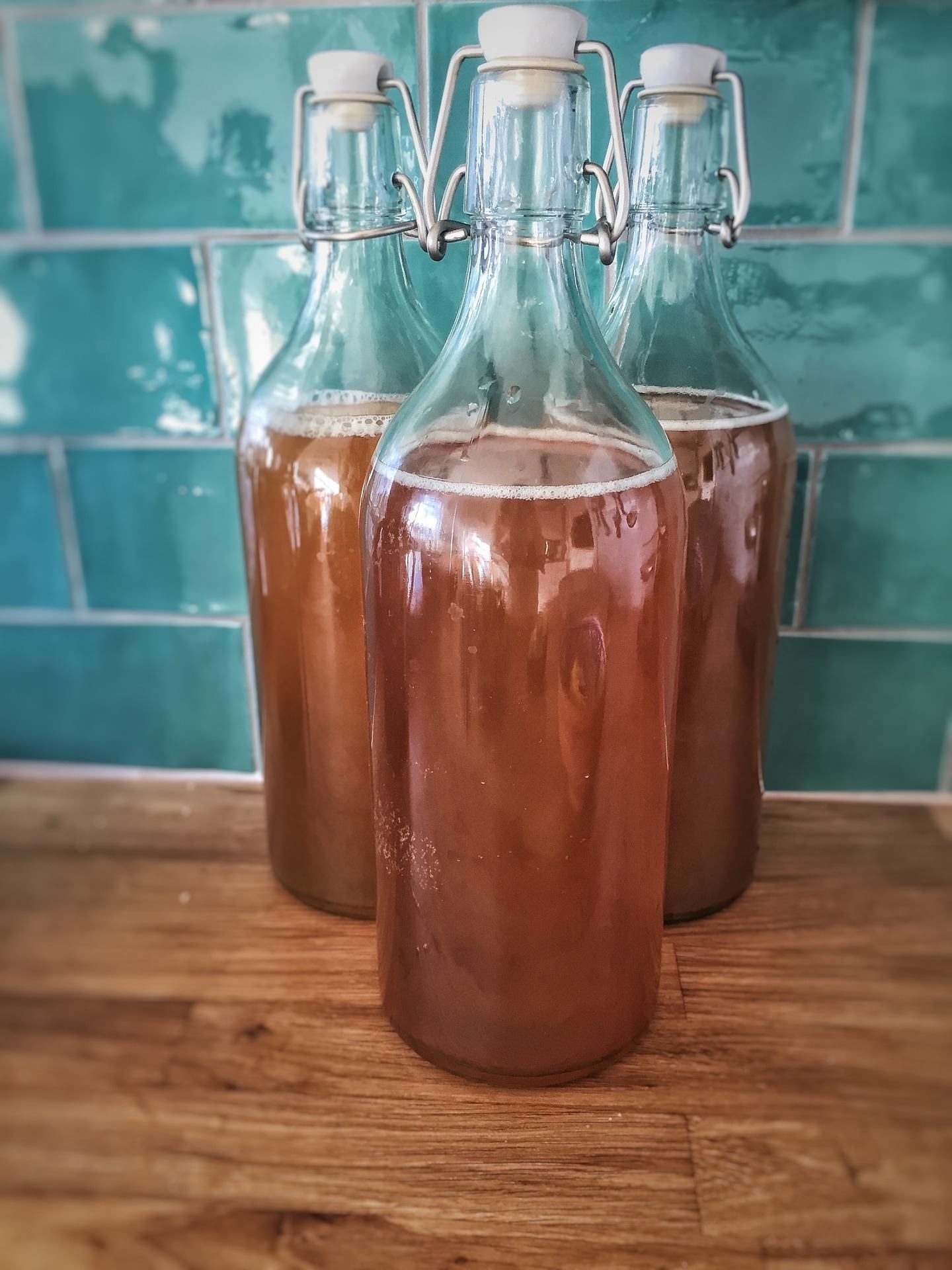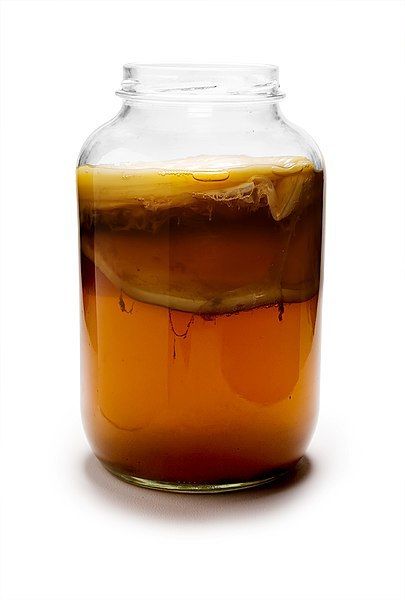Kombucha is a fizzy, tea-based drink that existed for thousands of years already. It is known for its health benefits and a new take on tea. So not only is it good for the body, but it is also good for the gut! Is Kombucha a probiotic? Most probably yes, and it is more than that.
What is kombucha
Another name for kombucha is tea mushroom or kombucha tea, but what is it? It is a slightly alcoholic fermented black or green tea known for its health benefits. This drink is traditionally consumed in Manchuria, so it is thought to be originated from there. Nowadays, you can get this drink all over the globe.
Kombucha Making Process
So there’s a familiar word there – fermentation! That’s right, so, like kefir, this product is also fermented.
What is fermentation?
Well, to put it simply, it’s the breaking down of a substance with the help of yeast, bacteria, and/or other microorganisms. Kind of like digestion.
If kefir has a milk base, kombucha has a “tea” base. If you have a green or black tea, add some sugar to it and then add the specific strains of bacteria and yeast. Allow it to ferment for a week or more, and ta-dah! You got yourself a kombucha drink.
So why is it called “tea mushroom”? You see, during the fermentation process, a floating blob forms on the surface of the liquid. This film like blob is a “symbiotic colony of bacteria and yeast”, or SCOBY. To be clear, this “mushroom” nickname isn’t related to fungi. It is just used to describe the blob formed.
Like kefir grains, this blob can be filtered and then reused to create more kombucha tea.
Health benefits
If you use a green tea base for your kombucha, you may automatically get the nutrients of that tea. It contains polyphenols and powerful antioxidants that are beneficial to the body.
Different studies showed that regular tea drinking can:
- increase the calories burned
- improve cholesterol levels
- reduce belly fat
- blood sugar control
- help reduce risk of prostate, breast and colon cancer
Not only is kombucha rich in antioxidants but it is also rich in B-vitamins as well as folic acid. For all coffee-lovers out there, you might want to try out kombucha because it also contains caffeine.
Is Kombucha a probiotic?
Similar to your kimchi, kefir, and yogurt, kombucha is loaded with healthy bacteria for the gut. There is no definitive study about the probiotic effect of kombucha, even if it contains a wide variety of lactic acid bacteria. These bacteria may produce probiotic functions.
Why should you drink probiotic food anyway?
Probiotics are the beneficial or healthy bacteria that you need in your gut. A probiotic usually contains the Lactobacillus strain, but sometimes some Bifidobacterium and Saccharomyces strain can also be available.
There are still some things that the body cannot digest, such as cellulose and fibers. This is where the local gut bacteria kick in. They aid in the digestion process and even synthesize short-chain fatty acids and vitamin K.
Antibacterial Property
The unique thing about kombucha drink is that one of the byproducts produced is acetic acid. Sounds familiar? Yep, it’s also abundant in vinegar. This gives the unique sourness in the kombucha drink. This acetic acid is capable of killing different potentially harmful microorganisms.
Another bonus is that if you make kombucha tea from black or green tea, you’d get a drink with strong antibacterial property. In a study conducted, it showed that there is a broad range of Candida species that the kombucha can fight against. It also showed that by using a green tea base for the kombucha tea, you can get higher antibacterial potential than from using black tea.
But wait! Kombucha is a probiotic but it has an antibacterial property? What happens to the bacteria of the kombucha then? Well, besides the study that focused on fighting the Candida species, the effect of kombucha generally suppresses the growth of harmful bacteria and yeasts. The healthy and helpful bacteria are safe from the antibacterial property of the drink.
Risking it
One of the main selling points of kombucha is that it contains microorganisms, right? But that is also a source of risk for this drink. You’re growing microorganisms, right? So if the drink is not prepared properly, there is a chance of growth of harmful bacteria or molds.
There are different reports on the cases of illness caused by kombucha since the mid-1990s. Some ailments reported are allergic reactions, nausea, liver problems, and lactic acidosis. The last part is problematic because it is the build-up of lactic acid in the body. This is a temporary condition and is usually caused by intense exercise.
Some symptoms of lactic acidosis include:
- Rapid breathing
- Muscle ache
- Nausea
- Stomach pain
The Issue
According to the FDA, kombucha is safe when it is properly prepared. When brewing one at home, food safety becomes an issue.
Why?
Because you’re not just dealing with food that can be washed, you’re dealing with live microorganisms. One tip is to use clean glass, stainless steel or plastic containers for your homemade tea. Keep your hands and equipment sanitized at all times.
Even if it has caffeine, don’t rely on kombucha for your caffeine boost. It contains low caffeine content and there is a chance that you might get lactic acidosis from drinking too much of it. Simply put, you can’t turn to kombucha to get the hype that you usually get when you drink coffee.
Remember that there is no single food or drink that can be a superfood and solve a lot of health problems. So far, there is little evidence about the health benefits of kombucha to the body. The same goes for its probiotic benefits. If you want to give this drink a go, make sure that your pieces of equipment are clean and sanitized. Also, don’t binge drink it. Drink in moderation and try it one slurp at a time.
Have you ever tried making kombucha at home? How did it go?
[thrive_toggles_group”][thrive_toggles title=”References” no=”1/1″]https://www.webmd.com/diet/the-truth-about-kombucha https://www.healthline.com/nutrition/8-benefits-of-kombucha-tea#section1 https://www.ncbi.nlm.nih.gov/pubmed/24290641 https://www.health.com/nutrition/info-about-kombucha https://onlinelibrary.wiley.com/doi/abs/10.1111/j.1745-4514.2011.00629.x https://en.wikipedia.org/wiki/Kombucha [/thrive_toggles][/thrive_toggles_group]




I really like the unbiased nature of this post. I got the potential health benefits and then the potential risks. I have recently started making kombucha at home. I ordered a SCOBY and starter on Amazon and it’s been really easy. My first batch was a little too sweet and didn’t have many bubbles, but the second batch has been great. Thankfully, I only have small cups of kombucha, once or twice a day so I don’t think I’ll overdo it, but prior to reading your piece I didn’t know there were any risks, thank you!
I try to take specific probiotics as recomended by Dr Dale Bredesen in The End Of Alzheimer's. And as recomended by the FLCCC to prevent Covid and other viral infections. I list the key ones at the end. I also brew kombucha from a SCOBY given to me by a friend. I have no idea what 'bacteria and yeast' it contains.
My questions are these :
1.can I put a capsule of probiotic into my cooled sweet tea before feeding it to my SCOBY and induce the SCOBY to grow the probiotics I wish?
2. should I split the SCOBY first incase the probiotic would harm it?
3. is there any danger to me or the SCOBY by doing this?
4. is there any benefit to trying to induce my SCOBY to grow specific yeast and bacteria?
5. what probiotic species are normally in kombucha?
thank you for any info you can give or direct me to.
opps! I forgot to list the key probiotics.
Lactobacillus plantarum
Lactobacillus acidohpilus
Lactobacillus brevis
Bifidobacterium lactis
Bifidobacterium longum
Sarcomyces boulardii